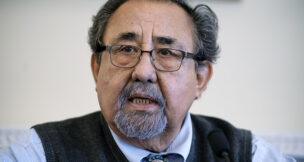Panel to study how reports of vulnerable adults are investigated
Julia Shumway//August 23, 2019//
More than a year after a patient with severe intellectual disabilities was raped at a Phoenix care facility, the task of preventing and investigating abuse of Arizona’s most vulnerable residents is still split among a patchwork of state agencies.
 An ad hoc committee led by Rep. Jen Longdon, D-Phoenix, will spend the next several months reviewing how abuse of vulnerable adults is reported and investigated. During the first meeting August 20, Longdon told committee members, most of whom represent state agencies or advocacy groups, to reflect on what they have changed since the patient’s abuse was revealed when she gave birth in December, what still needs to be changed and what the Legislature has to do to help.
An ad hoc committee led by Rep. Jen Longdon, D-Phoenix, will spend the next several months reviewing how abuse of vulnerable adults is reported and investigated. During the first meeting August 20, Longdon told committee members, most of whom represent state agencies or advocacy groups, to reflect on what they have changed since the patient’s abuse was revealed when she gave birth in December, what still needs to be changed and what the Legislature has to do to help.
The Legislature could review and consider changing statutes regulating various agencies to streamline the investigative process, committee member Jakenna Lebsock said. Lebsock, the clinical administrator for the Arizona Health Care Cost Containment System, said laws designed to protect patient confidentiality can make it harder for agencies to work together to address abuse.
“Especially as it applies to privacy and confidentiality, if there is a way to ensure we can have those conversations cross-agency, I think that would be a good idea,” Lebsock said.
About 43,000 Arizonans with disabilities including Down syndrome, cerebral palsy and epilepsy receive services through the Department of Economic Security’s Division of Developmental Disabilities, department director Michael Trailor told the committee.
Reports of abuse or neglect are investigated by Adult Protective Services, which is part of a different DES department, the Division of Aging and Adult Services. Adult Protective Services has 110 investigators and substantiates only a small fraction of the reports of abuse or neglect it receives.
One issue with taking and substantiating reports is making sure investigators and call center representatives are trained to communicate with people with various disabilities, said Jose de Jesus V. Rico, executive director of the Arizona Center for Disability Law.
“Having an email or an intake system online or even a phone call is not always enough,” he said.
If Adult Protective Services substantiates a report, the perpetrator can end up on a registry that now contains more than 1,400 people who have abused, neglected or exploited vulnerable adults.
That registry doesn’t coordinate with other states, so caretakers who may have abused vulnerable adults in other states or who move from Arizona to another state could slip through the cracks. Adult Protective Services also doesn’t investigate some reports from tribal nations.
If abuse or neglect occurred in a residential facility, the Department of Health Services would be in charge of investigating the facility itself.
“If a resident has been harmed in an assisted living facility and APS (Adult Protective Services) is working their side, what we can do is go in and look at the conditions of that facility,” said Colby Bower, assistant director of policy and intergovernmental affairs at the health department.
His department would look into whether facility staff had required background checks and whether it took in a patient it wasn’t capable of caring for, but it doesn’t decide whether abuse or neglect occurred. The department investigated about 4,500 complaints last year, and the majority came from long-term care facilities.
Longdon’s committee also heard that the agencies charged with preventing and investigating abuse of vulnerable adults are failing deaf residents.
Mesa mother Cynthia Elliott’s adopted daughter is profoundly deaf, medically fragile and has severe behavioral issues.
Her daughter, now 20, was in state custody at a Mesa hospital as a teenager, and Elliott said she visited one day to find the girl restrained naked and left alone in a room with no American Sign Language interpreter provided to help her communicate with the medical staff who should have been caring for her.
“If my daughter had had an ASL interpreter with her when she was in DCS custody and in the hospital, her abuse would not have happened,” Elliott said.
Now, as an adult, her daughter qualifies for services from the Division of Developmental Disabilities but can’t access them because the division doesn’t provide an interpreter, Elliott said.
Sherri Collins, executive director of the Arizona Commission for the Deaf and the Hard of Hearing and a member of the committee, said people with hearing loss who receive state services don’t see standard procedures, some as simple as making sure ASL interpreters are on hand during interactions with DES staff.
She urged the committee not to limit its definition of “vulnerable adults” to those who receive care through DES’s Division of Developmental Disabilities.
“We consider our community a vulnerable population even though many of them are not in the DDD population,” she said.


















